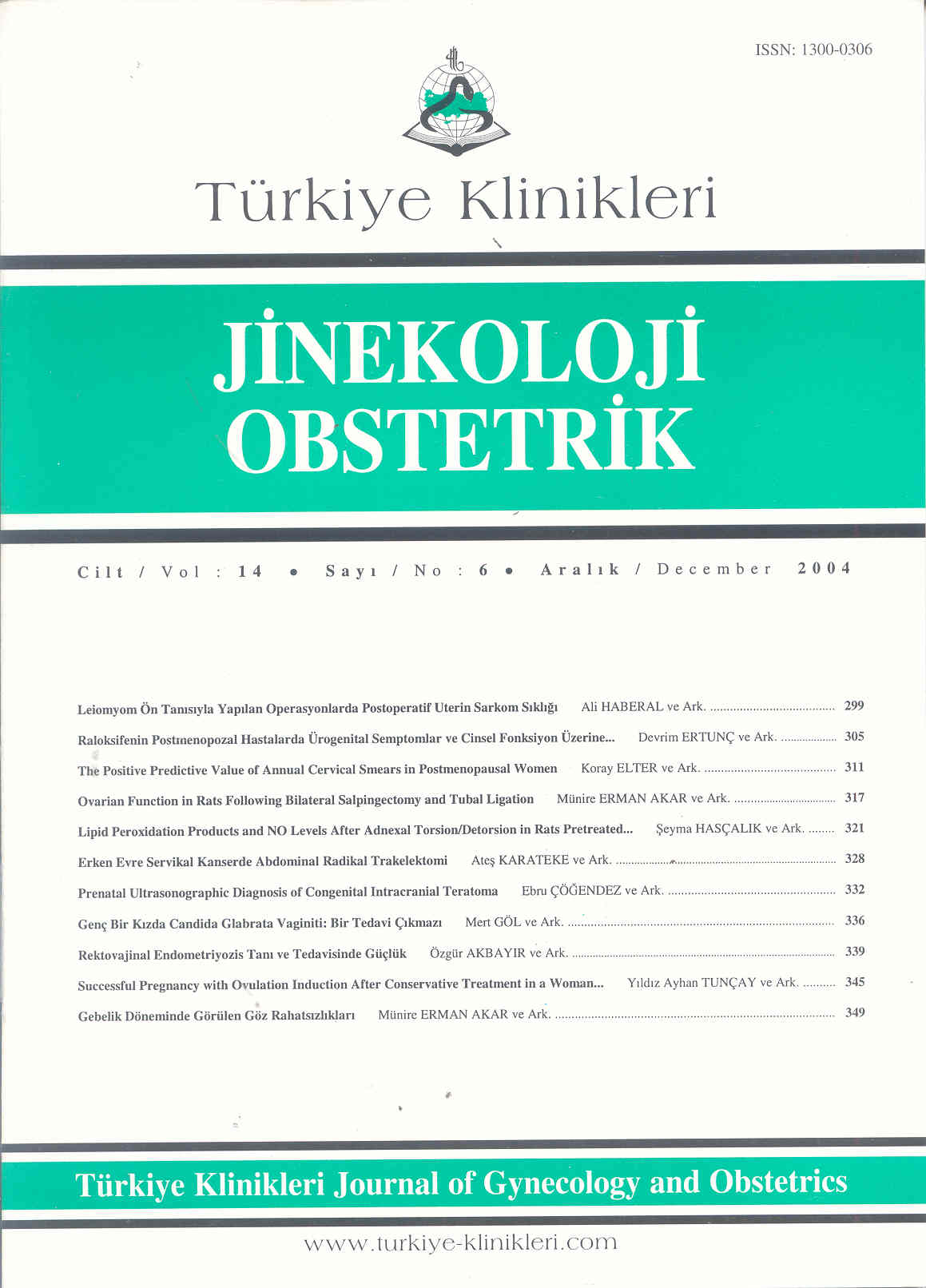Open Access
Peer Reviewed
CASE REPORTS
2528 Viewed1048 Downloaded
Difficulty In Diagnosis And Treatment Of Rectovaginal Endometriosis
Rektovajinal Endometriyozis Tanı ve Tedavisinde Güçlük
Turkiye Klinikleri J Gynecol Obst. 2004;14(6):339-44
Article Language: TR
Copyright Ⓒ 2020 by Türkiye Klinikleri. This is an open access article under the CC BY-NC-ND license (http://creativecommons.org/licenses/by-nc-nd/4.0/)
ÖZET
Bu çalışmada; tanı koymakta ve tedavide ciddi güçlük yaşanan rektovajinal endometriyozis olgusunu sunduk. Vajenden sarkan kitle şikayetiyle başvuran hastanın tekrarlayan biyopsi materyalleri incelendiğinde histopatolojik olarak; servikal polip, vajinal clear cell karsinom ve kolondan alınan biyopsilerinde ise polpoid mukozal displazi gibi tanılar konuldu. Hastanın laparoskopi sonucunda evre IV endometriyozis olduğunun görülmesi ve biyopsi materyallerinin tekrar incelenmesinde endometriyotik nodüllerin varlığı rektovajinal endometriyozis tanısına götürdü. Dokuz aylık medikal tedavi sonrasında klinik şikayetlerde gerileme olmaması üzerine cerrahi tedavi uygulandı. Hastanın postoperatif klinik şikayetlerinin gerilediği ve tam kür sağlandığı gözlendi.
Bu çalışmada; tanı koymakta ve tedavide ciddi güçlük yaşanan rektovajinal endometriyozis olgusunu sunduk. Vajenden sarkan kitle şikayetiyle başvuran hastanın tekrarlayan biyopsi materyalleri incelendiğinde histopatolojik olarak; servikal polip, vajinal clear cell karsinom ve kolondan alınan biyopsilerinde ise polpoid mukozal displazi gibi tanılar konuldu. Hastanın laparoskopi sonucunda evre IV endometriyozis olduğunun görülmesi ve biyopsi materyallerinin tekrar incelenmesinde endometriyotik nodüllerin varlığı rektovajinal endometriyozis tanısına götürdü. Dokuz aylık medikal tedavi sonrasında klinik şikayetlerde gerileme olmaması üzerine cerrahi tedavi uygulandı. Hastanın postoperatif klinik şikayetlerinin gerilediği ve tam kür sağlandığı gözlendi.
ANAHTAR KELİMELER: Rektovajinal endometriyozis, rektovajinal adenomyoma
ABSTRACT
In this study; we report a rectovaginal endometriyozis case who has serious difficulty in diagnosis and treatment. Patient who has polipoid mass protruding from the vagina had had multiple biopsies. After histopatologic investigations of the speciments, different pathologists diagnosed as vaginal clear cell carcinoma, cervical polip and colonic polipoid mucosal displazia for the biopsies from colon. For the confirmation of the malignency, biopsy specimens reevaluated. As laparoscopic examination diagnosed stage IV endometriosis and final patologic reevaluations results showed endometriotic nodules; we finally diagnosed of rectovaginal endometriyozis. Although nine months of medical treatment, no clinical regression has been seen. Surgical treatment has been applied. Postoperative follow up has showed complete clinical regression and cure.
In this study; we report a rectovaginal endometriyozis case who has serious difficulty in diagnosis and treatment. Patient who has polipoid mass protruding from the vagina had had multiple biopsies. After histopatologic investigations of the speciments, different pathologists diagnosed as vaginal clear cell carcinoma, cervical polip and colonic polipoid mucosal displazia for the biopsies from colon. For the confirmation of the malignency, biopsy specimens reevaluated. As laparoscopic examination diagnosed stage IV endometriosis and final patologic reevaluations results showed endometriotic nodules; we finally diagnosed of rectovaginal endometriyozis. Although nine months of medical treatment, no clinical regression has been seen. Surgical treatment has been applied. Postoperative follow up has showed complete clinical regression and cure.
MENU
POPULAR ARTICLES
MOST DOWNLOADED ARTICLES





This journal is licensed under a Creative Commons Attribution-NonCommercial-NoDerivatives 4.0 International License.











